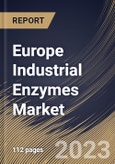Over the course of the projected period, the European Commission's propensity for boosting the production of biofuels and lowering greenhouse gas emissions is anticipated to benefit the market's expansion. The EU wants to use at least 14% renewable energy in transportation by 2030, with advanced biofuels accounting for at least 3.5% of the total. The fulfillment of this goal must be ensured by the EU member states' stipulation of duty on gasoline suppliers.
Oil treatment innovations powered by industrial enzymes have considerable economic advantages. Higher production levels and greater profitability can be achieved by businesses by increasing oil extraction rates. Additionally, the grade of extracted oil is improved by the efficient separation of oil and water, increasing its value and enhancing product purity. Enzyme use in these procedures results in oil treatment operations that are more successful and economical, providing competitive benefits for companies working in the oil and gas sector.
The European Union's plan for sustainable and circular textiles addresses both the manufacturing and consumption of textiles, while simultaneously acknowledging the importance of the textile sector. The industrial strategy, the new circular economy action plan, and the European Green Deal obligations are all implemented. As a result, more emphasis is being given to the use and development of industrial enzymes, which in turn is beneficial for the expansion of the regional market throughout the forecast period.
The Germany market dominated the Europe Industrial Enzymes Market by Country in 2022 and would continue to be a dominant market till 2030; thereby, achieving a market value of $725.8 million by 2030. The UK market is estimated to grow a CAGR of 5.6% during (2023-2030). Additionally, The France market would experience a CAGR of 7.2% during (2023-2030).
Based on Application, the market is segmented into Food & Beverages, Detergents, Animal Feed, Biofuels, Textiles, Pulp & Paper, Personal Care & Cosmetics, Wastewater, Agriculture, and Others. Based on Source, the market is segmented into Microorganisms, Plants, and Animals. Based on Product, the market is segmented into Carbohydrase, Proteases, Lipases, Polymerases & Nucleases, and Others. Based on countries, the market is segmented into Germany, UK, France, Russia, Spain, Italy, and Rest of Europe.
The market research report covers the analysis of key stake holders of the market. Key companies profiled in the report include Novozymes A/S (Novo Holdings A/S), DuPont de Nemours, Inc., Koninklijke DSM N.V., Chr. Hansen Holding A/S, Creative Enzymes, BASF SE, Kerry Group PLC, Associated British Foods PLC (Wittington Investments Limited), Amano Enzyme, Inc., and Megazyme Ltd. (Neogen Corporation)
Scope of the Study
By Application
- Food & Beverages
- Detergents
- Animal Feed
- Biofuels
- Textiles
- Pulp & Paper
- Personal Care & Cosmetics
- Wastewater
- Agriculture
- Others
By Source
- Microorganisms
- Plants
- Animals
By Product
- Carbohydrase
- Proteases
- Lipases
- Polymerases & Nucleases
- Others
By Country
- Germany
- UK
- France
- Russia
- Spain
- Italy
- Rest of Europe
Key Market Players
List of Companies Profiled in the Report:
- Novozymes A/S (Novo Holdings A/S)
- DuPont de Nemours, Inc.
- Koninklijke DSM N.V.
- Chr. Hansen Holding A/S
- Creative Enzymes
- BASF SE
- Kerry Group PLC
- Associated British Foods PLC (Wittington Investments Limited)
- Amano Enzyme, Inc.
- Megazyme Ltd. (Neogen Corporation)
Unique Offerings
- Exhaustive coverage
- The highest number of Market tables and figures
- Subscription-based model available
- Guaranteed best price
- Assured post sales research support with 10% customization free
Table of Contents
Companies Mentioned
- Novozymes A/S (Novo Holdings A/S)
- DuPont de Nemours, Inc.
- Koninklijke DSM N.V.
- Chr. Hansen Holding A/S
- Creative Enzymes
- BASF SE
- Kerry Group PLC
- Associated British Foods PLC (Wittington Investments Limited)
- Amano Enzyme, Inc.
- Megazyme Ltd. (Neogen Corporation)








